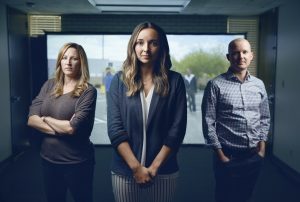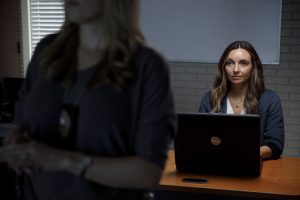Paulk ‘enlightened’ by police officers’ openness in unique study
By David Miller

As a counselor in training, Rachel Paulk is trained to “walk in clients’ shoes,” with hope that consideration of one’s circumstances will yield more effective care and outcomes.
She’s practiced this empathic approach daily as a counselor for youth sex offenders at residential facilities in Alabama, working diligently during treatment to consider their prior trauma and home situations.
Relating to disadvantaged youth isn’t too far of a reach — after all, adults were once children. But when a client works in a dangerous job where split-second decisions can result in casualties, walking in a client’s shoes can be difficult.
Paulk, a Millbrook native and graduate student at The University of Alabama, has discovered this firsthand, working with West Alabama-area law enforcement on an innovative research project that measures officers’ responses in various “shoot/don’t shoot” scenarios.
Paulk has worked with Dr. Ryan Cook, assistant professor of educational studies, psychology, research methodology and counseling, and Dr. Diana Dolliver, associate professor of criminology and criminal justice, in conducting two-hour sessions with officers and gathering their responses and neural data during virtual interactions with civilians. Paulk also organized the system’s massive database of scenarios and variables, which has helped streamline data collection and reduce the amount of time officers — who are on the clock during participation — spend with researchers.
The researchers use VirTra, a police training simulator that uses a large single screen with more than 100 scenarios that police officers face while on the job, like traffic stops, domestic disputes and distress calls. Officers use firearms with air cartridges during the simulation and are graded based on their actions, reaction times and the desired outcome of each scenario.
Paulk said she didn’t expect the officers to suspend their disbelief and immerse themselves in the scenarios, particularly as they were being evaluated in a scientific study.
“We tell them to treat it like a normal stop, to call out the commands like they’d normally do,” Paulk said. “I thought they wouldn’t want to yell out commands at the screen with just us in there, but they got really into it, calling for backup and reaching for their Taser in certain scenarios. That was really cool to see.”
The research combines behavioral, neurological and criminological components to better understand how officers respond in these scenarios, and researchers hope their findings will one day influence police training methods and officer selection.
“I went in thinking police officers wouldn’t be receptive to being studied, but to know they’re just as hungry for change as we are is really enlightening,” Paulk said.
Researchers have run about 30 participants thus far, and early findings indicate that years of service and prior military experience did not seem to impact the outcome.

Paulk presented the findings on a research poster at UA’s ESPRMC graduate research symposium in the spring and won the award for ESPRMC Graduate Research Symposium Merit Award.
“The results were pretty surprising,” Paulk said. “I couldn’t imagine having to make a split-second decision of whether or not to shoot. Being able to see what they actually encounter on a day-to-day basis, and how they put their lives on the line each day and how quickly things can escalate was eye-opening.
“Learning why, what and how on an important topic has been awesome.”
Paulk holds undergraduate degrees in psychology and criminal justice from UA and will earn a master’s degree in clinical mental health counseling in December. She’s applied to UA’s doctoral program in counselor education.
Currently she is a counseling intern with Working on Womanhood, a Tuscaloosa-based intervention program for adolescent females with a history of delinquent behavior and mental health-related issues.
Paulk hopes to continue working in residential settings.
“I’m also really interested in multi-systemic therapy — working with a child, their family, community and schools,” Paulk said. “It’s proven to have less recidivism rates and keeps the kid in their home.”
